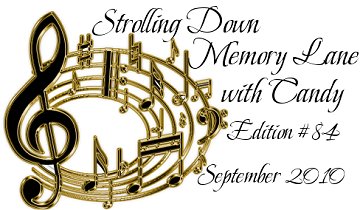
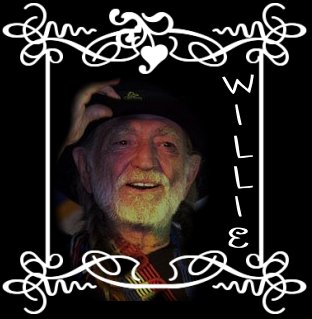
I remember the first time I saw him in concert in Florida, I knew that this man was reaching out across a crowd and touching my very heart. Years later I saw him out in Long Island, New York...the same thing happened again. The music and the man are never to be forgotten. Most people have no idea of the talent this man has, and the beauty of what he does; looks so effortless but is pure musical magic. Come on along now, Willie's waiting for us!
This versatile, eclectic, rather wanderlust country crossover star known for his classic ballads ("Always On My Mind"), autobiographical road songs ("On the Road Again") and catchy rhythms ("Mammas Don't Let Your Babies Grow Up to Be Cowboys") started out life as Willie Hugh Nelson on April 30, 1933, in Depression-era Abbot, Texas. After his mother abandoned the family and his father died, he and sister Bobbie Lee were raised by gospel-singing grandparents. Working in the cotton fields, Willie was handed his first guitar at age six and within a short time was writing woeful country songs and playing in polka bands. During his teenage years he played at high school dances and honky-tonks.
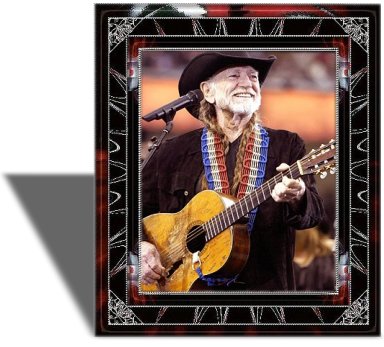
He also worked for a local radio station and by graduation time he had become a DJ with his own radio show.
Briefly serving a stint with the Air Force (discharged because of a bad back, which would plague him throughout his life), he sold his first song called "No Place For Me" while getting by with menial jobs as a janitor and door-to-door Bible salesman. Married in 1952 to a full-blooded Cherokee, he and first wife Martha had two children. He initially came to be known in Nashville for selling his songs to well-established country artists such as Patsy Cline ("Crazy"), Faron Young ("Hello Walls") and Ray Price ("Night Life"). In 1962 he recorded a successful duet with singer Shirley Collie, whom he would later take as his second wife, but his career didn't progress despite joining the Grand 'Ol Opry.
In the early 1970s, after extensive touring with his band (which included sister Bobbie on the piano) and experiencing a number of career downswings, he started performing and recording his own songs instead of selling them to others. Two of his albums, "Shotgun Willie" and "Phases and Stages", helped him gain some stature. In 1975 it all came together with the album "Red-Headed Stranger", which would become the top-selling country music album in history and propel him into the country music stratosphere.
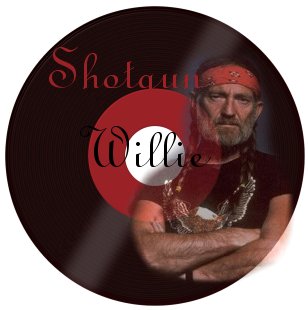
Nelson signed with Atlantic Records and released Shotgun Willie (1973), which won excellent reviews but did not sell well. Phases and Stages (1974), a concept album inspired by his divorce, included the hit single "Bloody Mary Morning". Nelson then moved to Columbia Records, where he was given complete creative control over his work. The result was the critically acclaimed, massively popular concept album, Red Headed Stranger (1975). Although Columbia was reluctant to release an album with primarily a guitar and piano for accompaniment, Nelson insisted (with the assistance of Waylon Jennings) and the album was a huge hit, partially because it included a popular cover of "Blue Eyes Crying in the Rain" (written by Fred Rose in 1945). "Blue Eyes Crying in the Rain" became Nelson's first number one hit as a singer.
Along with Nelson, Waylon Jennings was also achieving success in country music in the early 1970s, and the pair were soon combined into a genre called outlaw country ("outlaw" because it did not conform to Nashville standards). Nelson's outlaw image was cemented with the release of the album Wanted! The Outlaws (1976, with Waylon Jennings, Jessi Colter and Tompall Glaser), country music's first platinum album. Nelson continued to top the charts with hit songs during the late 1970s, including "Good Hearted Woman" (a duet with Jennings), "Remember Me", "If You've Got the Money I've Got the Time", "Uncloudy Day", "I Love You a Thousand Ways", and "Something to Brag About" (a duet with Mary Kay Place).
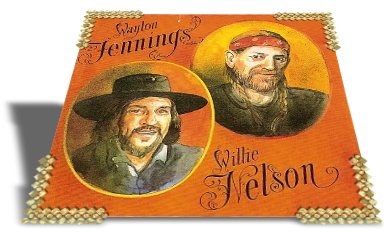
In 1978, Nelson released two more platinum albums, Waylon and Willie (a collaboration with Jennings that included "Mammas Don't Let Your Babies Grow Up to Be Cowboys", which was written and originally recorded as a hit single by Ed Bruce a couple of years earlier), and Stardust, an unusual album of popular standards. It was produced by Booker T. Jones. Though most observers predicted that Stardust would ruin his career, it ended up being one of his most successful recordings. Willie also had a notable success with the LP titled Half Nelson, including such great artists as Ray Charles.
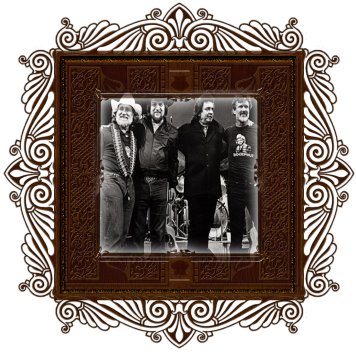
His offbeat phrasing, distinctive nasal tones and leathery, bewhiskered hippie-styled looks set a new standard for "outlaw" country music. Around 1978 Willie showed himself to be a loose and natural presence in front of the camera, thus launching a film career. He had roles in several movies, his first opposite Robert Redford and Jane Fonda in The Electric Horseman (1979). His took to leading roles as a country music star in Honeysuckle Rose (1980), which would include a number of his songs on the soundtrack. He played opposite James Caan and Tuesday Weld in Thief (1981) and a legendary outlaw in the western Barbarosa (1982). In the movie Red Headed Stranger (1986), which was adapted from his hit 1975 album, he played a preacher, and he teamed up with pal Kris Kristofferson as a pair of country singers in Songwriter (1984). He and pal Kristofferson went on to form The Highwaymen with the late Johnny Cash and Waylon Jennings and he successfully recorded and toured with the group for a number of years.
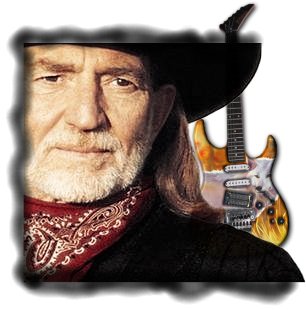
They also teamed up to remake the classic western Stagecoach (1939) as a TV movie (Stagecoach (1986) (TV)). As a unique song stylist, the bearded, braided-haired, bandanna-wearing non-conformist took a number of non-country standards and made them his own, including Elvis Presley's "You Were Always on My Mind" and Ray Charles' "Georgia on My Mind." He happily married fourth wife Ann-Marie in 1991 and has survived more hard times in recent years, including a $16.7-million debt to the IRS and the suicide of one of his sons, Billy. Inducted into the Country Music Hall of Fame in 1993, Nelson received the Kennedy Center Honors in 1998.
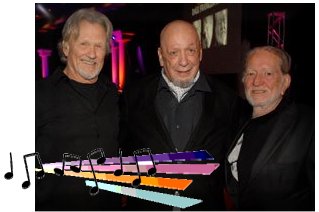
Willie Nelson, Kris Kristofferson and record producer Fred Foster graciously accepted awards honoring their unique leadership in country music during an invitation-only event on Sunday night (Aug. 29, 2010) in Nashville.
During the quick-moving, two-hour ceremony at the Renaissance Hotel, the three men each received the Dale Franklin Award and were serenaded by friends like Rodney Crowell, Jamey Johnson, Lyle Lovett, Lorrie Morgan, Dolly Parton, Randy Travis, Lee Ann Womack and several others. The award is named for the first executive director of Leadership Music, an industry networking organization that hosts the annual gala event.
While introducing Nelson, host Vince Gill brought laughs by carrying a brownie to the stage, which he said was a gift from Nelson. He also elicited a round of whoops and hollers when he said Nelson's face belonged on Mount Rushmore.
"He's done more for this country as a man than just about anybody," Gill said. "He's a great mentor and a great man to look up to. He is truly what I think America is about at its best. He's got some great eclectic fans, all over the world, that love Willie."
Johnson crooned a few lines from Nelson's poetic 1974 album, Phases and Stages, before easing into a commanding acoustic rendition of "Angel Flying Too Close to the Ground." Morgan came on next with a sultry "Crazy," while Travis followed with a low-key "Funny How Time Slips Away."
After the musical portion, Brenda Lee recalled meeting Nelson when she was a child and praised his kind personality.
"You don't get any more real than Willie," she said. "I've known him since I was 10 years old, and all these years later, I can honestly say that Willie Nelson hasn't changed a bit. More important than that, the spirit of Willie Nelson has never changed. ... I'll tell you, Willie may look laidback, but he is absolutely one of the most disciplined, focused people I have ever known when it comes to his craft. I've always wondered how somebody could be that laid back and cool and still get so much done."
I'm not sure either, but just hope and pray he keeps on doing it...
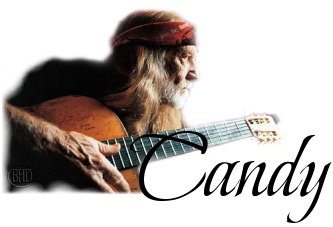
Strolling Down Memory Lane Main Page